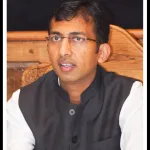For centuries, Kashmiri literary tradition, as critics have outlined, was said to be characterized by its peculiar quintessence of mysticism in which the idea of Kashmiriyat was nourished and propagated.In its essence, Kashmiriyat was characterized by an emphasis on the syncretic values of pluralism and tolerance. In the first half of 20th century, one can see agreater commitment, engagement and sensitivity to “topicality” in Kashmiri poetry. During this period, in the mainstream Kashmiri poetic tradition, one can see eminent poets like Ghulam Ahmad Mahjoor, Abdul Ahad Azad, and later on, Dina Nath Nadim along with few others, giving a fresh impetus to Kashmiri poetry, which, in the words of scholar Jawahar Lal Handoo, “freed Kashmiri literature from heavy Persio-Arabic influence to take it out from literary stagnation.” Many of their poems have achieved the status of revolutionary anthems. Although few Kashmiri scholars have strangely drawn parallels between Abdul Ahad Azad and English Romantic poet John Keats, but it is the poetry of another English Romantic poet, PB Shelley, and German poet, Bertolt Brecht, and of course, the Urdu poets of the Progressive Movement that one can see having significant resonance with that of Azad’s . Interestingly, Brecht was born in 1898 and died in 1956.
Abdul Ahad Azad was born as Abdul Ahad Dar in Ranger, Chadoora, Budgam, in 1903. Before his untimely death in 1948, he produced a fine volume of poetry.“Kuliyat-i-Azad” and “Haraam e Saba” are two of his poetic collections. He has also written a work on literary history in Urdu called “Kashmiri Zabaan aur Shaeri.”
The new kind of poetry written by poets like Abdul Ahad Azad and Ghulam Ahmad Mehjoor, which had greater commitment and topicality, heralded the beginning of the Progressive influences in Kashmiri literature. It also coupled with the emergence of a new political conscious which was informed by secular-plural outlook. Azad shared this political awakening; he was very much part of the new Progressive tradition.
Abdul Ahad Azad played a significant role in synchronizing the Kashmiri poetic tradition with the contemporary times. The seemingly ahistoricity of Kashmiriyat as a purely abstract discourse can be seen turning into a modern Secular-Progressive ideal through Azad’s poetry. The revolutionary zeal combined with excellent creative skills is a hallmark of Azad’s poetry which transformed and reoriented the Kashmiri poetic tradition. In his poetry, he expresses passionate yearning for social emancipation by giving voice to the voiceless sections of the society like peasants.He exhorts people to embrace modern, rational outlook to fight against the old biases, superstitions and prejudices. He was highly influenced by Marxist outlook. His poetry demonstrates a commitment towards the dawn of a new, progressive society where all the edifices of exploitation and inequalityshall break as Marx had envisaged in his philosophy. He had great praise for Karl Marx and the October Revolution which led to the formulation of Soviet Union.
He has also written an eulogy to the Bolsheviks for overthrowing the Czars in Russia during the October Revolution. He sees it as a great victory of the proletariats over the feudal authoritarianism.This significant aspect can be found in many of Azad’s poems including in River (Daryaav), Nalaye Budshah (the lament of Budshah), Shikwah-e-Kashmir (The complaint of Kashmir), Myoun Wattan (My Motherland), etc. The profound concern towards the suffering masses percolates his poetry throughout.
Azad’s vision of the suffering humanity is historical in sense, not abstract, existential or ahistorical. He wants to be the conscious keeper by being an agent of change, and change for a better life and tomorrow. His poems like Taqdeer (Destiny), Be-Khudi and Khudi express his philosophy of praxis and positive action rather than mere abstraction.The ardent yearning for a better tomorrow; an egalitarian society based on equality and pluralism is overtly present in his poetry. More such themes can be intensely found in his tour de force poems like River (Daryaav).In his poem Taranai Wattan, (Songs of the country) he exhorts upon the youth to be the agents of change and progress.
In his poem, “The Stars Speak To Man”, Abdul Ahad Azad addresses all the humans and their historically constructed regressive institutions. Through the image of Star, a mirror is being shown to the humans and their institutions. It reminds one of the philosophies of great French philosopher JJ Rousseau.
Azad also outlines this pluralistic appeal in his poetry as he seeks to reorient the concept of Kashmiriyat into a more progressive, secular-modern ideal or way of life. It is something that can hold mirror to us in the contemporary times. Azad firmly stands up for pluralism and secular progressive outlook which are the essences of Kashmiriyat and Indianness. He is also averse to the propagation of religiously driven division and hatred. In the contemporary times, this can hold a great lesson for all of us.
The unique feature of Abdul Ahad Azad’s poetry just doesn’t lie only in its “social message”, but it also combines the aesthetic with the topical. Or one can say, it seeks to redefine the Aristotlean aesthetic. On analyzing Azad’s poetry, one is inevitably reminded of Prem Chand’s famous remarks, “We have to change the standards of beauty” [Hamein husn ka mayaar badalna hoga], made at the opening Progressive Writers Conference in Lucknow in 1936. It has to be said that the dialectic of the aesthetic and the topical gives rise to fresh literary paradigms not only in Azad’s poetry, but also in the modern Kashmiri poetry.
It is here that Abdul Ahad Azad takes the Kashmiri literary tradition to a new manifestation where his poetry can be studied in sync with its immediate situatedness or circumstances. Such poetry engages in a critique of what eminent Chilean author, Ariel Dorfman, has called the “standard, uniform patterns of culture.” But in no way, does the aesthetics in such poetry take a backseat. Such poetry upholds its own aesthetic standard as charged reality or “topicality” gets polished and reflected through the poet’s literary craft and imagination. One can see that Abdul Ahad Azad’s poetry in terms of aesthetics, diction and theme seems to reorient the Kashmiri literary tradition in a new way. And his poetic talent just diversifies and enriches our tradition further.
(The Author is Assistant Professor in English, Amar Singh College, Cluster University Srinagar)





